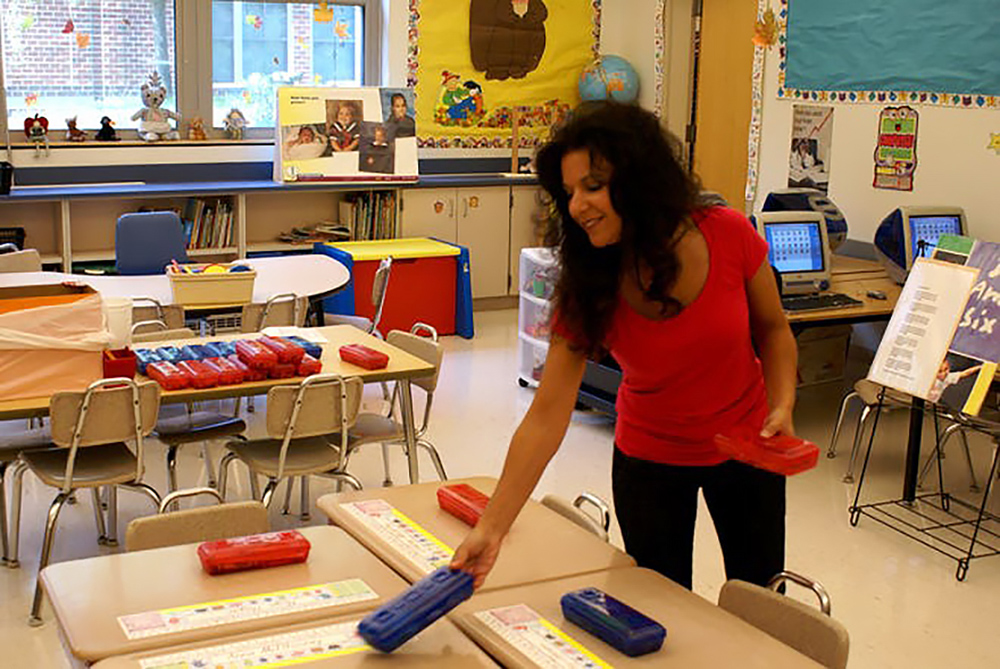By Julia Train
About three months ago, students left their classrooms to enjoy summer break. In less than a week, they will return, trading their bathing suits for school clothes. Parents will have a quiet house again.
During the school year, teachers spend countless hours preparing their classrooms and curriculum to be positive and inclusive. They spend at least six hours a day Monday through Friday with someone else’s children. They tend to have a strong impact on their students for years to come and build unforgettable bonds. Here are teachers’ perspectives on heading back to school this year.
At the end of August, they head into their schools to arrange their classrooms and plan their first week of lessons.
“One of the issues we have a lot of times in the Pleasantville district is change of administration. So [sometime in] August we hear from the new principal finding if there’s a theme [for the year],” said Russell Weems, a graphic literature teacher at Pleasantville Middle School.
This year, “I am Groot” is the theme, fitting right into the subject he teaches. So this week, he’ll decorate within the theme and plan the first couple of weeks of classes before school starts on Sept. 6.
Weems has been an educator for 25 years. He decided to become one after several years in the restaurant industry. Weems started working in the high school and taught literature for 19 years. However, he transitioned to teaching middle school six years ago.
“One of the biggest lessons I learned is that the kids can tell if you’re just in it for a job and whether you care about them and want them to learn,” said Weems. “Some of the biggest lessons you teach them are not so much the things that are in the curriculum, but things that are life lessons.“
Tiffany Smith, an educator for about 24 years, is a fifth-grade inclusion teacher at Sovereign Avenue School in Atlantic City. Her school doesn’t separate those with disabilities from the regularly paced classes. Instead, half the subjects are taught by one teacher and the rest are taught by her. As a result, the students do not necessarily know which one is the special education teacher.
Smith takes her time in July to mentally prepare for August, when she starts getting ready. Smith receives her class roster in the middle of the month and starts picking up supplies. She then plans the first week’s schedule, aiming to focus on community-building activities and making her classroom a safe space.
Her favorite part of teaching is watching her students gain new skills and confidence in themselves. “Sometimes I have to believe in the kid more than they do,” said Smith.
Jess Riordan, an emotional regulation impairment teacher (ERI) for third through fifth grade at the Atlantic County Special Services School enjoys watching her students grow too. Like Smith, she focuses on building connections with the students and between each of them.
Her role includes teaching normal subjects such as English language arts, math, science, and social studies. She also works with students on improving their behaviors and social-emotional skills.
Although it’s only her second year, she has wanted to be a teacher since kindergarten, but she didn’t know she wanted to be where she is now until she started substituting in the school six years ago.
“I was placed in an ERI classroom and absolutely loved it,” said Riordan. “These kids all come from different backgrounds and getting to be that supportive person for them every day was just something I really enjoyed.”
Teaching is a special career that takes a great deal of patience and empathy. Educators plant seeds in children and are essential in the development of their futures.
If you could give yourself advice when you were entering your first year of teaching, what would you say?
“I would tell myself to be prepared for anything because every year is different. You never know what’s coming through the door.”- Terri Watkins, an EHT school district paraprofessional for 23 years.
“I would tell myself to relax, be confident that you know what you’re doing and think about what would help [the students] 10 years down the road and do what’s best for them.”- Weems
“I wish I learned earlier to just keep being a reflective teacher so that I can keep growing. If I were talking to 20-something Tiffany, I’d say, ‘Don’t give up. Change is good.’ Because some teachers get stuck in grade levels and they don’t ever leave so you don’t ever grow.” – Smith
“I would probably tell myself that everything is going to work out the way it’s supposed to be. I definitely try to overplan everything so much that it stresses me out. So to take that additional stress off, I would definitely tell myself, everything is going to work out the way it’s supposed to be.” – Riordan
What advice do you have for students entering a new school year?
“Embrace every day. I would like them to know that when they walk in the door, the teachers are their friends. So I would hope they come in the door and they’re happy about school, because some of them come from pretty rough home lives.”- Watkins
“Appreciate where they are and try their best to learn something from their teachers because there’s a lot of things that they can teach them and that some of the social aspects, though they may be difficult, are things that you need to get keep your focus on when you’re in school that it’s a learning environment and there’s so much that you can learn from people.” – Weems
“Every year is a brand new year and you get a fresh start.” – Smith
“I think that I would tell them that they should go into the school year thinking about all the new and fun exciting things that they’re going to learn and try and just make the most out of it. Become friends with everyone and just make the most out of it.” – Riordan










